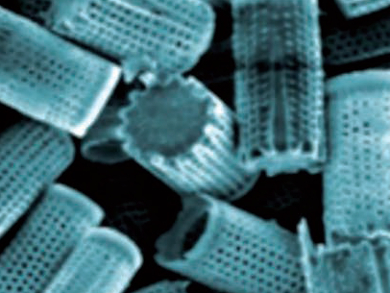Diatoms are single-celled algae with shells that consist of hydrated silica. These shells have a large variety of different shapes depending on the species (example pictured), and are often porous. The fossilized remains of diatoms form diatomaceous earth, a sedimentary rock that is mined and used, e.g., for filtration, as an abrasive, in thermal insulation, or as cat litter.
Abel Santos, Andreas Evdokiou, and Dusan Losic, University of Adelaide, Australia, and colleagues have used inexpensive diatomaceous earth to produce mesoporous biodegradable silicon nanoparticles (SiNPs). These particles can be used as a drug delivery system for chemotherapy.
The team prepared the SiNPs by purifying commercially available diatomaceous earth to obtain pure diatom silica microcapsules. They then crushed these capsules into nanoparticles, and converted the silica to silicon by magnesiothermic reduction. The particle size was further reduced with sonication and finally, the particles were loaded with the chemotherapeutic agent doxorubicin (DOX).
The researchers tested the drug release from the DOX-loaded nanoparticles in vitro and found a pH-dependent sustained drug release with improved cytotoxicity against cancer cells compared to free DOX. The prepared SiNPs themselves proved noncytotoxic.
- From The Mine to Cancer Therapy: Natural and Biodegradable Theranostic Silicon Nanocarriers from Diatoms for Sustained Delivery of Chemotherapeutics,
Shaheer Maher, Tushar Kumeria, Ye Wang, Gagandeep Kaur, Dina Fathalla, Gihan Fetih, Abel Santos, Fawzia Habib, Andreas Evdokiou, Dusan Losic,
Adv. Healthcare Mater. 2016.
DOI: 10.1002/adhm.201600688




